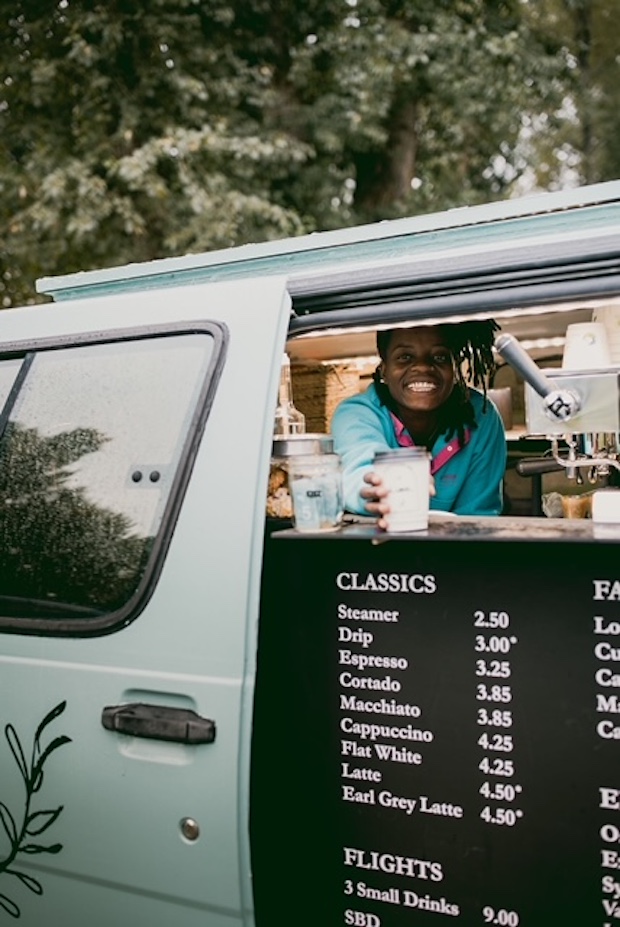Aimerance Merveille can recall childhood days in the Democratic Republic of Congo — wearing her favorite red floral dress, watching her brothers play soccer, daydreaming.
Yet while other children were thinking about who-knows-what, Merveille was often daydreaming about food and gatherings. By the age of 10, Merveille was experienced at feeding groups of people, and the feelings those experiences inspired have stayed with her ever since.
Now based in Montreal, Quebec, Merveille is applying that spirit to her newly acquired role as relationship manager at Semilla Coffee, a specialty coffee importer with ties to Rwanda, Honduras, Guatemala and Colombia.
Coffee, Connection and Career
Merveille’s formal career in coffee has been relatively short but remarkably ascendant. After moving to Uganda and eventually to Canada 13 years ago, Merveille took her first coffee job in 2017 as a barista at G.O.A.T Coffee in Camrose, Alberta.
From there, Merveille’s interest in coffee blossomed, as she was promoted to barista trainer then cafe manager. The product also began to interest her on a broader scale, as she pieced together how the exported agricultural goods make their way across continents and through various hands before ultimately reaching a coffee cup.
“Being an African, my brain doesn’t know how to not think about, ‘how do people in the West get their things?’” Merveille recently told DCN, adding that such thoughts led her to seek further coffee education and experience.
“There are a lot of barriers to growth in the industry,” Merveille said of her early barista work. “You have to spend your own money and your own time. Education is really hard to come by.”
By 2019, Merveille was beginning to write down ideas for a coffee business of her own. In the pandemic year of 2020, she bought a 1994 Ford Aerostar van, converting it to become the flagship mobile coffee bar under the name Veille Café.
With clean black and white design, the menu maintained a focus on classic coffee drinks, Merveille attempting to make genuine connections with customers.
“I wanted to make it all about coffee, so I didn’t want to complicate the menu. I just wanted to have the classic things,” Merveille said. “I didn’t want it to be a place about sugar or latte art. I wanted people to leave my shop feeling like they learned something new about what goes on behind the scenes.”
A New Direction
In March of this year, Merveille returned to the DR Congo for the first time in 16 years. There, she learned firsthand about particular difficulties in exporting coffee, particularly in regions that have been affected by economic and social instability. She left DR Congo with a new purpose.
“I want to see my country back on the market,” she said. And I want it to be the specialty market because that’s where the farmers stand a bit of a chance to actually make what they’re worth.”
She returned home to Canada and made the difficult decision to close Veille Café in order to pursue opportunities in the importing/exporting field that aligned with her values. She said she wanted to go beyond “just learning the names and the region where their coffee farm is located” and help create more meaningful human connections in the coffee trade.
Merveille said she’s found that opportunity at Semilla, following a “shot in the dark” application with the green coffee importing company. She’s been with Semilla since August.
“It’s nice to be hired by a company that sees value in the same things I do,” Merveille said. “Everything I want to do with my family back home can just be added to what the company is already doing. It’s an incredible place in the industry to be in.”
Here’s more from a recent conversation with Aimerance Merveille:
What about coffee excites you most?
I think it’s pretty awesome how working in coffee connects you to so many different people just because of how many hands are needed to get the product to arrive at a brewing stage. Coffee is mostly consumed in places that it isn’t grown and the layers of relationships needed in order for coffee to be what we need it to be is one of my favorite things about it.
What would you like to see change in coffee?
I think one of the saddest things is the dishonesty. I don’t want to say ignorance because I think there are a lot of people with a lot of power and money involved who can see that they benefit off of gatekeeping. I find that a lot of the truths we don’t find in coffee aren’t because they’re hard to come by, but because they are intentionally made hard to understand. So it’s the intentional dishonesty within the industry that is so upsetting.
Just the way coffee is consumed across the global market, it holds such financial power to open up so many economic doors in countries where it’s grown, but coffee is another example of the effects of neocolonialism — where people with a lot of money have a lot to say about places where they don’t live. When you’re a person who wants to highlight these things, people say you’re looking for problems or are only focusing on the problems, but I just think that people who benefit from living without integrity will always feel attacked by those who wish to change things by pursuing truth no matter the cost.
What would you be doing if it weren’t for coffee?
If it was not for coffee, I would probably still be a photographer. That’s what I did before. One of my favorite things is helping startups with marketing and content photography. If I wasn’t working in coffee, I’d be working alongside business owners.
Is there someone in the coffee industry who inspires you? Nominate them for a “Three Questions” feature here.
Jen Roberts
Jen Roberts is a Paris, France-based writer and avid coffee drinker. She’s currently writing a book on women in coffee.









Comment